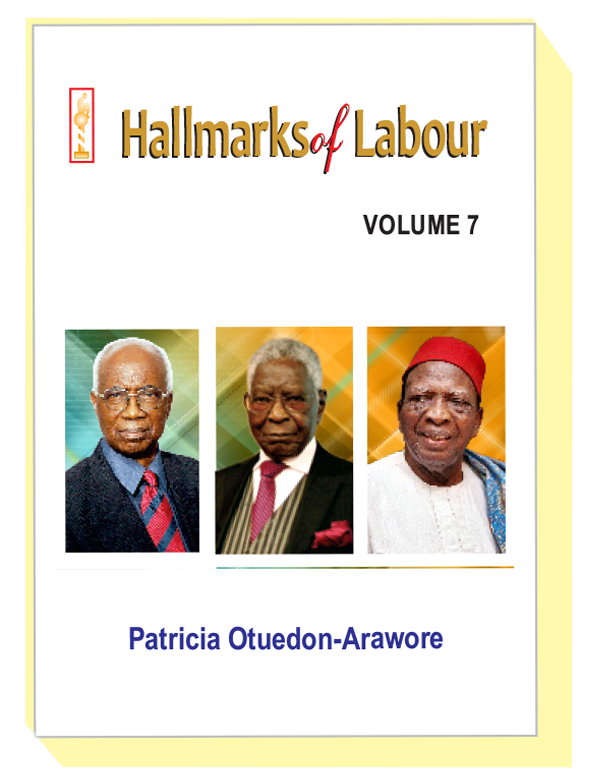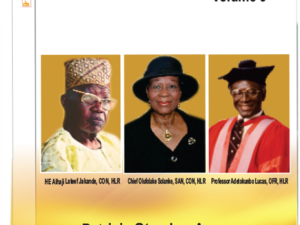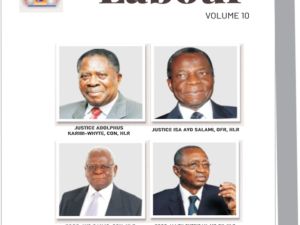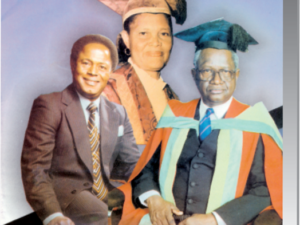Hallmarks of Labour, Volume 7
Hallmarks of Labour Volume 7 majorly focuses on the lives, achievements and lessons from three individuals, two eminent jurists and a distinguished Professor of medicine. They are
- Late Hon. Justice Obakayode Samuel Eso, CON, CFR, FNAILS, HLR
- Professor Benjamin Obi Nwabueze, NNOM, CON, SAN, FNIALS, HLR
- Professor Oladipo Olujimi Akinkugbe, CON, CFR, FRCP, FWACP, FAS, NNOM, FNAS, HLR
By Mrs. Patricia Otuedon-Arawore
Published by MAHOGANY LIMITED(2010)
Suite A49-64;Ikota Shopping Complex
By Victoria Garden City, Lagos Expressway
Aja, Lagos, Nigeria.
Tel: 08100749811 or 014619568
REVIEW
Hallmarks of Labour Volume 7, written by Patricia Otuedon-Arawore is a 470 page book published by Mahogany Limited, a Publishing Division of Hallmarks of Labour Foundation, 2014. ISBN: 978-36232-0-9. It majorly focuses on the lives, achievements and lessons from three individuals, two eminent jurists and a distinguished Professor of medicine. They are
– Late Hon. Justice Obakayode Samuel Eso, CON, CFR, FNAILS, HLR
– Professor Benjamin Obi Nwabueze, NNOM, CON, SAN, FNIALS, HLR
– Professor Oladipo Olujimi Akinkugbe, CON, CFR, FRCP, FWACP, FAS, NNOM, FNAS, HLR
Preamble
It is indeed a great honour for me to have been invited by the Hallmarks of Labour team to review Volume 7 of the Hallmarks of
Labour, put together by Patricia Otuedon-Arawore. At first glance, I was excited but quickly humbled by the calibre of personalities that
this volume has chosen to celebrate. Imagine being comprehensively introduced to Hon. Justice Obakayode Samuel Eso of blessed memory,
Professor Benjamin Obi Nwabueze and Professor Oladipo Akinkugbe. Indeed, we are in for a great feast of life and times of these special
men of integrity and achievement.
We begin by observing that this is a well edited book of 470 pages, simple in appearance, but beautifully packaged, and reader-friendly.
With this volume the author has once more shown consistency in her exertions at documenting men and women who have achieved distinction
in our society by dint of hard work and uncommon courage and integrity. I cannot, but commend her for this effort. The general
foreword is written by no other than the eminent and cerebral Chief Emeka Anyaoku, CFR, HLR who extolled the virtues of our celebrants.
He observed for example, that Hon. Justice Kayode Eso’s reputation is unblemished among those who have occupied the seats in Nigeria’s
Supreme Court, and that he was universally respected for his courage, integrity and clarity of judgment.
He further noted that Professor Ben Nwabueze is widely acknowledged in Nigeria and beyond as a foremost Constitutional Lawyer and voracious
author of several books on the history and practice of constitutionalism in Africa. Professor Nwabueze it was observed, has been a distinguished law academic in several countries, and has participated in the making of several national constitutions.
Our third role model, Professor Oladipo Olujimi Akinkugbe does not really need any introduction, especially in the field of medicine.
This is a man that became a Professor of Medicine at a very young age of 35, and later became a distinguished University Administrator.
It is therefore clear that the selection of these distinguished individuals as subjects of our exertions in Hallmarks of Labour Volume 7 is merited.
For the author, this Volume is dedicated to two outstanding role models who have passed on, but still live in our hearts and in our aspirations – His Excellency, Ambassador Dr. Matthew Mbu CFR, HLR and Honourable Justice Kayode Eso.
In respect of methodology the author has chosen a rather simple approach of introducing each celebrant with a forward written by a renowned Nigerian, presenting the background and achievements of the role models and drawing lessons from these. And finally presenting a brief overview of the home front. This is simple and practical. However, what was rather laborious is the infusion of several presentations of the celebrants into the book, which I consider an over-kill. This contributed in no small way to the increased size of the book. This does not however take away the insights and lessons that may be derived from the presentations, if one is patient enough to read them. For the future, it may be necessary to include only selected presentations mindful of the overall size of the book.
Hon. Justice Emmanuel Olatunde Ayoola (p.3) wrote the forward on Hon. Justice Kayode Eso. The author very lucidly documented the
achievements of Hon. Justice Eso. According to Justice Ayoola, for Justice Eso, justice was a passion. Justice was a way of life…; it gave him courage where others would have crumbled. Kayode Eso’s disciplne, reliability and authority were borne out of knowledge, and he poured out wisdom. The forward for Professor Benjamin Obi Nwabueze is written by Professor U.U Uche, while that for Professor Oladipo Akinkugbe was written by H.E Ambassador Kolade, CON.
Hon. Justice Samuel Obakayode Eso CON, CFR, FNIALS, HLR and recipient of the 2007 Peace Builder Award – jointly with H.E Kofi Anan is also recipient of the HLF Life-Time Achievement for Exemplary and Courageous Service to the advancement of Nigeria’s Legal System in
Adjudication (HLR).
Hon. Justice Eso was born September 18, 1925 and hails from Ilesha,
Osun State. It is important to note that his father had ten wives, in
other words, he came from a polygamous family. If this does not make
one wise, what will? Obakayode was a name given to our role model by
his grandfather, and he was superintended by a strict father who
instilled discipline in him. As of necessity, he received training in
farm work and trading. Hon. Justice Eso had a father who detested
discrimination in any form, and this rubbed off on his son.
Hon. Justice Eso was an exceptionally bright student, coming first
several times in his class from his primary to secondary education.
Justice Eso was influenced by seasoned lawyers like Eusibeus James
Alexander Taylor, R.A. Fani-Kayode, F.R.A. Williams and G.B.A Coker
amongst others.
Although he adored the legal profession, young Eso had a short stint
as a teacher while saving for his travel abroad, to Ireland. In
short, Hon. Justice Eso obtained his Bachelor of Laws degree in June
1953, Moderatorship (B.A Hons. Degree) in Legal Science, in October
1953, called to the English Bar, November 1954 and enrolled as a
Solicitor and Advocate of the Supreme Court of Nigeria in December of
1954.
It is important to note that upon his return to Nigeria after his
5-year studies abroad with several degrees, Hon. Justice Kayode Eso
set up practice in Jos, where he met other legal practitioners like
Lawrence Odiatu Victor Anazonwu, Godfrey Charles Ubaka Agbakoba
(father of Olisa Agbakoba SAN) and many others.
Apart from having a successful legal practice spanning several years,
Kayode Eso developed good contacts in the course of his practice with
people like Mohammed Bello (later Chief Justice of Nigeria), Mamman
Nasir (later, a Justice of the Supreme Court of Appeal) and others.
He had a short stint in the then External Affairs (lasting only a few
days), and the Western Nigeria Public Service. As Acting Judge of
Western Region, he was appointed based purely on recommendation and
merit by the Lord Chief Justice C.J. Morgan. This is a lesson for us,
considering what we all know obtains today.
More importantly, Justice Eso had a baptism of fire as the new Acting
Judge of the Western Region when his first case involved the
playwright and university teacher, Wole Soyinka, who had been accused
of robbery (allegedly invading the premises of the broadcasting House
at Ibadan.) He was pressured by the political class to convict him,
but Justice Eso stood his ground, thereby allowing himself the
necessary space and freedom to give judgment based on facts, equity
and justice. His reputation as an impartial Judge soared. The
accused was discharged and acquitted.
Justice Eso’s predisposition to duty could be summarized as diligence,
prompt attendance at sessions and gentlemanly conduct. To be in his
court, you have to key into these qualities. Justice Eso’s
appointment to the Supreme Court (JSC) of Nigeria followed the same
pattern, (no lobby, and no pre-knowledge) as his earlier appointments
to the High Court and the Western State Court of Appeal.
Important landmark cases involving Hon. Eso include the Soyinka Case
just mentioned, the “Twelve-Two Thirds” case, in which he delivered a
minority judgement rejecting the ‘Twelve-Two Thirds’ interpretation of
the Presidential elections results during the Second Republic.
Speaking on leadership, Hon. Justice Eso stated that the first quality
of leadership is to be enamoured by essence and selflessness. It is
to serve not counting the cost, and to be committed to the truth unto
death. This is really a very strong assertion, but Hon Justice Eso
stood by these all through his years. In short, Hon. Justice Eso had
profound views and on subjects like the Rule of Law, Leadership,
Democracy and Corruption, Checks and Balances, the character of our
previous Constitutions, religion and the secular state. He also
espoused wisdom in international law and international relations,
dissecting the link between peace and war. He also delved into the
matter of ethics in business and the professions. For him, ethics is
the performance of excellence, doing the right thing, by the right
person, at the right time, be it in his business, profession or even
in ordinary life.
Volume 7 of Hallmarks of Labour also comprehensively documented
testimonies about the person and achievements of Justice Kayode Eso –
from several eminent personalities that include H.E. President
Goodluck Jonathan, GCFR on Justice Eso’s 85th Birthday, as well as
Chief Olusegun Obasanjo, GCFR as President and Commander-in-Chief,
Federal Republic of Nigeria, in 1999.
As a family man, Justice Kayode Eso was happily married for some 58
years to Mrs. Helena Aina Eso and had two children.
We can conclude about the person and lessons from Hon. Justice Kayode
Eso by taking excerpts from the tribute given by Chief Wole Olanipekun
SAN about him.
“……….. He was one of the most profound and gifted lawyers the Judges
ever produced by the Common Law Jurisdictions worldwide. He dominated
his time and age. He reasoned tall and expressed himself robustly.
Justice Eso was incorruptible and rose above reproaches. He was a
mentor and role model to most of us. A big vacuum has been created in
the legal firmament and I have serious doubts if there would ever be
another Kayode Eso.”
I move quickly to the second segment of the book on Professor Benjamin
Obi Nwabueze NNOM, CON, SAN, FNIALS, HLR. This book very
well-articulated who Professor Nwabueze is – as a profound
intellectual mind that interrogated and diagnosed the far recesses of
law, and left for posterity vast wealth of knowledge that can last
several centuries. In very quick succession between 1963 and 1983, he
had published nine legal books that stood him out as a distinguished
academic colossus earning him local and international recognition.
Some of his well-known classics include The Machinery of Justice in
Nigeria 1963), Constitutional Law of the Nigeria Republic (1964) and
the Constitutionalism in the Emergent States (1973).
He became a Senior Advocate of Nigeria (SAN) in 1978, a unique honour
reserved for the very best of the legal profession. He also received
the National Merit Award from then President Shehu Shagari in 1980. He
is also the second Nigerian (after Dr. Taslim Elias) to earn a
doctorate degree in Law [LL.D] through published works. He is also the
first Senior Advocate of Nigeria (SAN) awarded from the academia, in
1978. He is equally a recipient of the Hallmarks of Labour Life-Time
Achievement Award (HLR) for Exemplary and Courageous Service to the
Achievement of Nigerian Legal system – Academics and Publishing.
Born in his hometown of Atani-Ogbaru in Anambra state, probably March
22nd 1931 (see page 194), Professor Nwabueze is the sole survivor of
his siblings since December of 2005. Educated mainly at mission
schools in Onitsha, it was his mother that encouraged him to further
his education. Professor Ben Nwabueze was a very brilliant student at
the African College in Onitsha. He was exceptionally good in
Arithmetic, Algebra and Geometry to the extent that he was drafted to
teach mathematics to the lower classes which did not have a teacher.
He later proceeded to the University of London, where he bagged LL.B
and came first among the students of the Inner Temple. He furthered
his expertise in law by bagging an LL.M, and later worked at the
University of Lagos, University of Nigeria and the University of
Zambia.
He also spent 10 years with the United bank for Africa and voluntarily
retired in 1987 to set up his legal practice at Ebute-Metta, Lagos. In
some of his writings and presentations he extensively explored the
place of the Igbos in modern Government, as well as the Nigerian Civil
War and lessons learned. He also extensively discussed the twin evils
of perversion and corruption especially on the recurrent to capital
expenditure ratio (see page 315). He has also severally made his views
known on the need for a National Conference in Nigeria and the
challenges of federalism in the country.
Some of the key lessons from Professor Nwabueze include the imperative
for individuals to develop their own values and ethics, but especially
to realize that truth is life. For him, truth should govern our lives
as well as the country. This is because when truth is destroyed
justice is destroyed.
As a family man, Professor Nwabueze has 10 children from three wives
and all are doing well in their chosen endeavours.
The third major segment of this book is dedicated to Professor Oladipo
Olujimi Akinkugbe CON, CFR, FRCP FWACP, FAS, NNOM, FNAS, and HLR.
From the forward written by no other than Dr. Christopher Kolade CON
on Professor Akinkugbe, it is hilarious to note that Dr. Kolade
immediately observed that it was always possible ab-initio to predict
that Professor Akinkugbe will become a Professor of something right
from their days at the Government College Ibadan. But that this was
only possible as long as it was not Physical Education. Well, this is
Dr. kolade`s version. Perhaps, Professor AKinkuge probably has his own
version of their relationship.
It is insinuated in the book that perhaps Professor Akinkugbe`s
intellectual eminence comes from his studious curiousity. It is
therefore not surprising that became a world authority in the field of
medicine, as well as a most articulate communicator of ideas in the
English language. If you doubt this you are please requested to read
his “Swirling Currents: Swollen Streams “, valedictory lecture
delivered decades ago in Ibadan. It suffices to say that Professor
Akinkugbe is a very successful Professor of medicine, who through the
years has relied on his work to speak for him.
Professor Akinkugbe garnered several accolades through the years that
include Commander of the Order of the Niger (CON), Commander of the
Federal Republic of Nigeria (CFR) and recipient of the Nigerian
National Order of Merit [NNOM]. He is also the youngest Professor of
medicine to be appointed by an African University. He was also awarded
Hon. Doctor of Service from seven different universities. And finally,
he is a recipient of Hallmark of Labour HLF Role Model Award.
In respect of background, Professor Akinkugbe was born July 17, 1933
in Ondo, present Ondo state. It suffices to say that from an early
stage, he began to appreciate the superiority of commendation, the
virtues of honesty, fairplay, sharing and accommodating, and empathy.
As is usual with many role models he experienced what is akin to
spartan discipline from his father. Repeatedly, we have seen in the
lives of our role models, the role that discipline, truth, convictions
or what we may call integrity has done in guiding and shaping the
achievements of our role models.
After his studies at the University College Ibadan, he proceeded to
the London Hospital for clinical studies and later worked at Kings
College, London, Adeoye Hospital, Ibadan, University of Ibadan, and
was later elected Dean of Medicine in 1970 at the same university
attracting several local and foreign support for the Faculty. He also
helped build up the University College, Ilorin to the University of
Ilorin relying on his experience and hard work. Unfortunately before
he could consummate his hardwork at the University College, Ilorin; he
was appointed Vice Chancellor of Ahmadu Bello University, where he did
not really have a good experience as documented in his autobiography.
It suffices to state that over several years Professor Oladipo
Akinkugbe served Nigeria and the international community in several
capacities. He has written extensively and presented his thoughts at
the various presentations he had been invited to make. His mastery and
use of the English language is impeccable for one who had spent
decades as a Professor of Medicine.
In reference to ‘Swirling Currents and Swollen Streams’, Professor
Akinkugbe stated in one of his presentations that honest and
purposeful leadership is a key imperative for success– whether it is
funding, organizing, implementing or in contributing one’s quota. And
that this leadership is not limited to the man at the top.
In sum, Professor Oladipo Akinkugbe is to be remembered for his
immense contributions to human welfare, particularly through medicine
and educational administration. Quoting Professor Jubril Aminu, former
University Vive-Chancellor, Minister and Ambassador, and now a Senator
of the Federal Republic of Nigeria – “Professor Akinkugbe has served
so well and so sincerely that tribute paid to him should be seen as
arising from deep appreciation and not the result of fashionable
compliance with the emotions of the present”.
I cannot but end the review of this section by noting the support of
Professor (Mrs.). Folashade Akinkugbe to our role model since 1965. A
Professor of Child health, she must be doing something right to have
coped with Professor Akinkugbe all these years – indeed, the Professor
himself after several year of marriage observed that if a marriage
must succeed, “…….there must be mutual cultivation of the spirit of
compromise and accommodation”. Note that he used the word
cultivation. In otherwords, conscious efforts must be made for a
marriage to succeed.
At this stage, I wish to once more extend my thanks to the organizers
of this public presentation of Hallmarks of Labour, Volume 7 for
inviting me to serve as Reviewer. It has indeed been an honour to
speak about these eminent Nigerians who achieved great heights through
dint of hardwork and uprightness. My appreciation to the author,
Patricia Otuedon-Arawore and her team for the excellent work done.
The author very diplomatically requested that I keep the review within
reasonable time. I was therefore torn between capturing the major
thrusts of the book and keeping to time. I do hope that I have been
able to convey a reasonably good idea of what the book is all about –
a biographic compendium of qualified, eminent and highly respected
role models that Nigeria should be proud of.
After perusing Hallmarks of Labour, Volume 7, I without hesitation
commend the choice of the celebrants and the quality of the
presentation of materials, indeed, the mistakes were so few that I
could not really engage in any meaningful critique of the Volume. This
book is therefore recommended to all, especially lovers of wisdom and
integrity. You are all enjoined to get copies or at least, a copy of
this memorable document for yourself, friends and children. Be rest
assured that this act of yours is really unquantifiable!
Thank you all for your patience.
Professor Osita Agbu
Nigerian Institute of International Affairs






Reviews
There are no reviews yet.